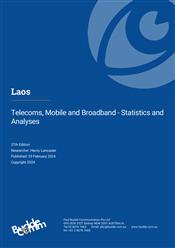Laos Telecoms Market Report
Telecoms, Mobile and Broadband - Statistics and Analyses

Last updated: 29 Feb 2024 Update History
Report Status: Current
Report Pages: 112
Analyst: Henry Lancaster
Laos making progress on its digital transformation strategy
When Laos joined the World Trade Organisation (WTO) in 2013 one of the conditions of admittance was to establish an independent regulator for its telecom sector within two years. The has yet to be achieved, with the result that the Ministry of Posts and Telecommunications (MPT) retains the primary role in regulating the country’s telecom market. With the government also having a financial stake (in part or in whole) in every one of the major fixed-line and mobile operators, the MPT’s position and decision-making is far from being independent.
This has created the situation whereby development of the telecom market has largely been stifled. The regulatory regime appears at times to be openly hostile to free market competition, and has cracked down on attempts to increase the value of services through more competitive pricing offers. Indeed, pricing controls effectively limit the ability of telcos to offer promotions or special price packages. In turn, this has led to an environment which offers few incentives for providers to invest in new infrastructure or improve service quality. Sufficient returns on investment cannot be guaranteed with such strict pricing controls, and there is the constant potential for political interference.
As a result of these limitations, fixed-line and mobile penetration rates have remained much lower than in neighbouring South East Asian markets. Nevertheless, there are signs of growth in the mobile broadband segment as LTE network coverage slowly widens. In January 2024, the country’s first 5G service was launched by Lao telecom, though restricted to a few locations around Vientiane, including tourist areas, shopping malls, universities, and the international airport.
The government has several strategies aimed at improving the digital transformation of the economy, based on a digital government, digital society, and digital economy. It is aimed at growing the digital economy from 3% of GDP (in 2022 terms) to 10% by 2040.
Key developments:
- LTC re-launches a commercial 5G service in Vientiane.
- Laos makes progress with its digital transformation plan through to 2040.
- Report includes the regulator’s latest annual report on the ICT sector, ITU market data updates, updated Telecom Maturity Index charts and analyses, recent market developments.
Companies mentioned in this report:
Lao Telecom (LTC), ETL, Unitel, Beeline, Planet Online, Huayuan Electronics.
Related Reports
- Asia - Mobile Infrastructure and Mobile Broadband
- Asia - Fixed Broadband Market - Statistics and Analyses
- Asia - Mobile Network Operators and MVNOs
- Timor Leste (East Timor) - Telecoms, Mobile and Broadband - Statistics and Analyses
- Sri Lanka - Telecoms, Mobile and Broadband - Statistics and Analyses
- Kazakhstan - Telecoms, Mobile and Broadband - Statistics and Analyses
- Japan - Telecoms, Mobile and Broadband - Statistics and Analyses
- Hong Kong - Telecoms, Mobile and Broadband - Statistics and Analyses
- Philippines - Telecoms, Mobile and Broadband - Statistics and Analyses
- Mongolia - Telecoms, Mobile and Broadband - Statistics and Analyses
Share this Report
TMT Intelligence
A platform to scale your intelligence tasks
Monitor critical insights with our AI-powered Market Intelligence Platform gathering and analyzing intelligence in real time. With AI trained to spot emerging trends and detect new strategic opportunities, our clients use TMT Intelligence to accelerate their growth.
If you want to know more about it, please see:
Research Methodology
BuddeComm's strategic business reports contain a combination of both primary and secondary research statistics, analyses written by our senior analysts supported by a network of experts, industry contacts and researchers from around the world as well as our own scenario forecasts.
For more details, please see:
More than 4,000 customers from 140 countries utilise BuddeComm Research
Are you interested in BuddeComm's Custom Research Service?
Hot Topics
News & Views
Have the latest telecommunications industry news delivered to your inbox by subscribing to BuddeComm's weekly newsletter.